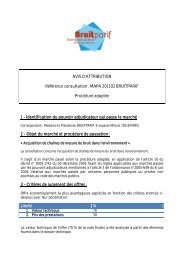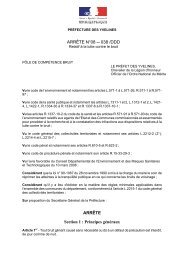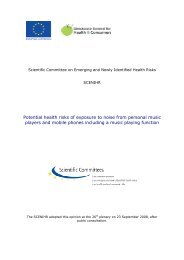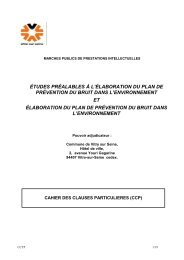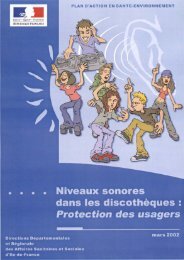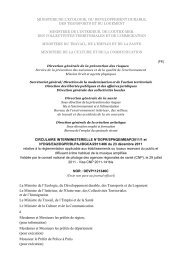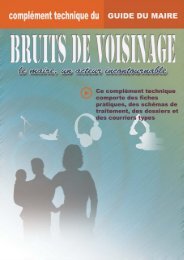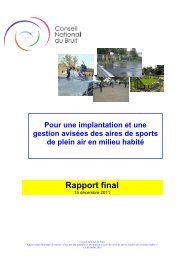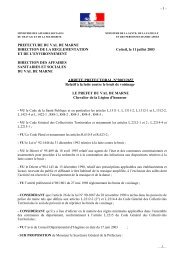Night noise guidelines for Europe - WHO/Europe - World Health ...
Night noise guidelines for Europe - WHO/Europe - World Health ...
Night noise guidelines for Europe - WHO/Europe - World Health ...
You also want an ePaper? Increase the reach of your titles
YUMPU automatically turns print PDFs into web optimized ePapers that Google loves.
34<br />
SLEEP AND HEALTH<br />
causal relations. Menopause seems to involve disrupted sleep in relation to hot flushes,<br />
depression/anxiety and sleep-disordered breathing. Oestrogen is associated with<br />
improved sleep quality but it is not clear whether the effects are due to a reduction<br />
of hot flushes. Oestrogen also improves sleep-disordered breathing.<br />
With respect to background factors, age is an established predictor of disturbed sleep<br />
(Karacan et al., 1976; Bixler, Kales and Soldatos, 1979; Ancoli-Israel and Roth,<br />
1999; Ribet and Derriennic, 1999; Leger et al., 2000; Sateia et al., 2000).<br />
Interestingly, however, older age may be related to a lower risk of impaired awakening<br />
(Åkerstedt et al., 2002c), that is, in this study it was easier to wake up and one<br />
felt better rested with increasing age, while at the same time sleep quality was lower.<br />
The increased risk of disturbed sleep is consistent with the increasingly strong interference<br />
of the circadian morning upswing of the metabolism with increasing age<br />
(Dijk and Duffy, 1999). Thus sleep maintenance is impaired and when sleep is interrupted<br />
“spontaneously”, the awakening is, by definition, easily accomplished and<br />
will be lacking in inertia. This ease of awakening may be interpreted as “being wellrested”,<br />
and obviously the need <strong>for</strong> sleep is not great enough to prevent an ef<strong>for</strong>tless<br />
transition into wakefulness.<br />
In addition, sleep homeostasis seems to be weakened with age in the sense that sleep<br />
becomes more fragmented and SWS or power density in the delta bands decrease<br />
(Williams, Karacan and Hursch, 1974; Bliwise, 1993; Dijk et al., 1999). As mentioned<br />
above, the effects are more pronounced in males, a fact that may be linked to<br />
reduced levels of growth hormone and testosterone.<br />
2.3.3 PERSONS EXPOSED TO STRESSORS AS A RISK GROUP<br />
A number of epidemiological studies point to a strong link between stress and sleep<br />
(Åkerstedt, 1987; Urponen et al., 1988; Ancoli-Israel and Roth, 1999). In fact, stress<br />
is considered the primary cause of persistent psychophysiological insomnia (Morin,<br />
Rodrigue and Ivers, 2003). That stress can affect proper sleep seems obvious, but<br />
Vgontzas et al. (2001) at Pennsylvania State University College of Medicine have<br />
found another reason why middle-aged men may be losing sleep. It is not just<br />
because of what they worry about; rather, it is due to “increased vulnerability of<br />
sleep to stress hormones”.<br />
As men age, it appears they become more sensitive to the stimulating effects of corticotropin-releasing<br />
hormones (CRH). When both young and middle-aged men were<br />
administered CRH, the older men remained awake longer and slept less deeply.<br />
(People who don’t get enough of this “slow-wave” sleep may be more prone to<br />
depression.)<br />
The increased prevalence of insomnia in middle age may, in fact, be the result of<br />
deteriorating sleep mechanisms associated with increased sensitivity to arousal-producing<br />
stress hormones, such as CRH and cortisol. In another study, the researchers<br />
compared patients with insomnia to those without sleep disturbances. They found<br />
that “insomniacs with the highest degree of sleep disturbance secreted the highest<br />
amount of cortisol, particularly in the evening and night-time hours”, suggesting<br />
that chronic insomnia is a disorder of sustained hyperarousal of the body’s<br />
stress response system. Also, recent epidemiological studies have shown a connection<br />
between disturbed sleep and later occurrence of stress-related disorders such<br />
as cardiovascular diseases (Parish and Shepard, 1990; Nilsson et al., 2001;<br />
NIGHT NOISE GUIDELINES FOR EUROPE



